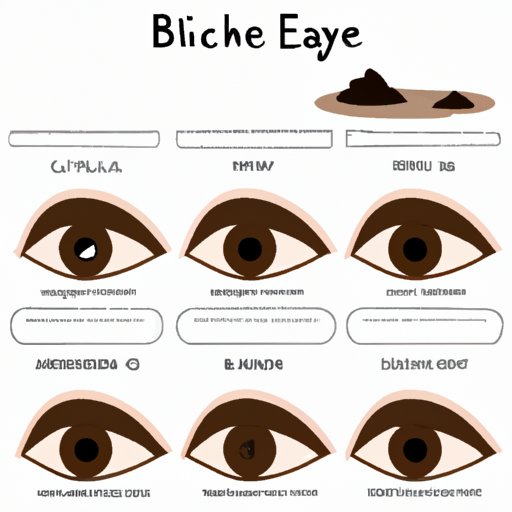
I. Introduction
Accidents happen, and one of the most common injuries people experience is a black eye. Black eyes are characterized by discoloration and bruising around the eye, and they can be painful and unsightly. While black eyes can be caused by a variety of reasons, including accidents, sports injuries, and fights, there are steps you can take to reduce their appearance and promote healing.
In this article, we’ll explore different remedies to get rid of a black eye fast, including home remedies and medical treatments. We’ll also provide advice on maintaining proper nutrition and hydration for speedy recovery, tips for avoiding future injuries, and how to conceal a black eye using makeup and accessories.
II. Home Remedies
If you’re looking for natural ways to help reduce inflammation and bruising around the eye, there are several home remedies you can try:
- Ice: Apply a cold compress to the affected area for fifteen minutes at a time several times daily for the first two days. This helps reduce swelling and bruising
- Arnica: Arnica cream or gel can be applied to the area twice a day to help reduce bruising and inflammation
- Tea bags: Soak a tea bag in hot water, allow it to cool, and then apply it to the eye for ten to fifteen minutes. The tannins found in tea help constrict blood vessels and reduce swelling
- Pineapple: Pineapple contains an enzyme called bromelain that has anti-inflammatory properties. Eating pineapple or applying it directly to the skin can help reduce swelling and pain
- Chamomile: Chamomile tea bags can also be applied to the eye for ten to fifteen minutes to help reduce swelling and bruising. Chamomile has anti-inflammatory properties and can also promote relaxation and stress-relief
These remedies are generally safe, but it’s important to note that some people may experience allergic reactions to certain natural remedies. Always test a small amount of any remedy on a small patch of skin before applying it to the entire affected area.
III. Medical Treatment
If home remedies aren’t effective enough, or if the black eye is caused by a more serious injury, medical treatment may be necessary. Here are some medical treatments that your doctor may recommend:
- Over-the-counter pain relievers: Pain relievers like ibuprofen or acetaminophen can help manage pain and reduce swelling
- Prescribed medication: Your doctor may prescribe medication to help reduce inflammation and pain
- Surgery: In rare cases, surgery may be necessary to repair a broken bone or other damage that is causing the black eye
It’s important to follow your doctor’s instructions carefully when using medical treatments, especially prescribed medication. Some medications can have side effects or interact negatively with other medications, so it’s crucial to inform your doctor of any medications you’re taking.
IV. Nutrition and Hydration
Getting proper nutrition and hydration is essential for the body to heal itself. Here are some tips for promoting healing:
- Water: Drinking plenty of water can help flush toxins out of the body and keep tissues hydrated for healing
- Antioxidants: Incorporating foods high in antioxidants, like blueberries and spinach, can help promote cell growth and reduce inflammation and bruising
- Protein: Consuming protein-rich foods, like lean meats and beans, can help repair damaged tissues
- Vitamin C: Foods rich in vitamin C, like oranges and peppers, can help promote collagen production and boost the immune system to speed up healing
It’s important to avoid foods and drinks that can hinder the body’s healing process, such as alcohol and foods high in sugar and salt.
V. Avoiding Injury
The best way to avoid getting a black eye is to prevent injuries from occurring in the first place. Here are some tips:
- Protective gear: Wear proper protective gear during contact sports, such as helmets and mouthguards
- Cautious driving: Drive cautiously and always wear a seatbelt. Avoid driving under the influence of drugs or alcohol
- Avoid risky activities: Avoid participating in activities with high-risk factors, such as fighting or extreme sports
- Treat injuries promptly: Seek medical attention promptly for any injuries, especially around the head and face
If an injury does occur, it’s important to seek medical attention right away, especially if symptoms like dizziness or loss of consciousness are present.
VI. Concealing the Black Eye
If you need to attend work or a special event with a black eye, there are ways to make it less noticeable using makeup and accessories:
- Concealer: Use concealer that matches your skin tone to cover the black eye. Apply it in thin layers and blend it with a sponge or brush for a natural look
- Accessories: Wear sunglasses or hats to cover the eye if possible. It’s important to avoid anything that could apply pressure to the eye area and cause further swelling
It’s crucial to not apply makeup or accessories until your injury has completely healed to avoid further infection or irritation.
VII. Prevention Tips
While accidents can happen, there are steps you can take to avoid getting a black eye in the first place:
- Avoid fighting: Avoid engaging in fights or altercations with others
- Manage stress: Practice stress-management techniques, like meditation and deep breathing, to avoid escalating potential conflicts
- Focus on balance: Maintain good balance and stability during physical activities to avoid falls and collisions
By taking preventive measures, you can reduce the risk of having to deal with a black eye in the first place.
VIII. Conclusion
Getting a black eye can be painful and unsightly, but there are steps you can take to reduce swelling and bruising, speed up the healing process, avoid future injuries, and make the black eye less noticeable. Whether you opt for natural remedies or medical treatment, it’s important to follow instructions carefully and take care of your body with proper nutrition and hydration. By staying cautious and mindful, you can help prevent black eyes in the future and stay healthy and safe.




